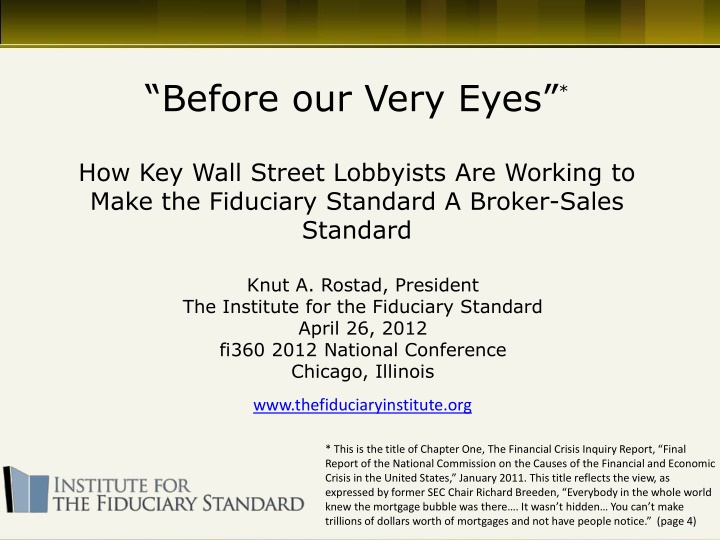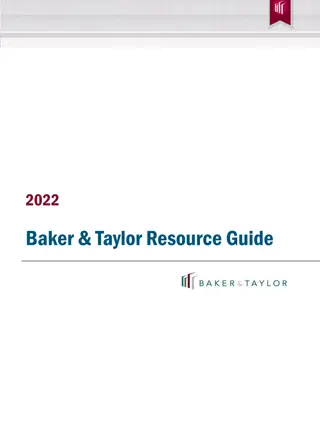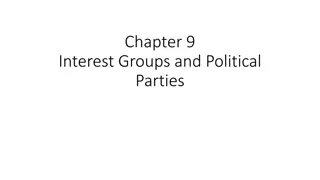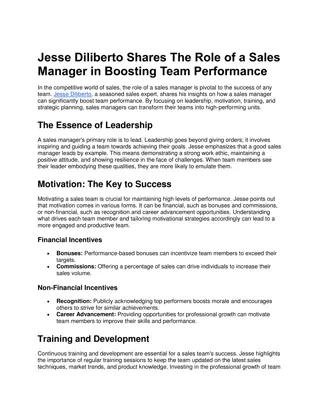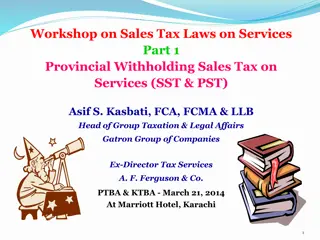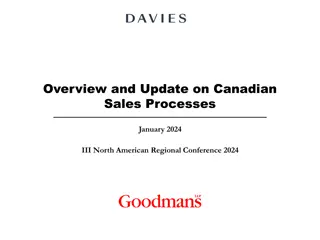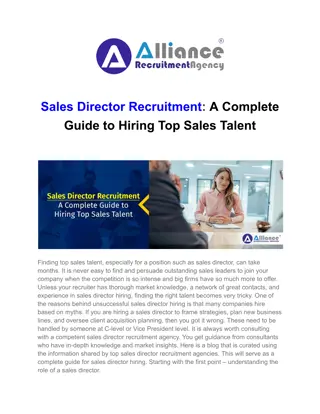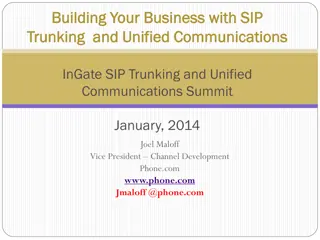Wall Street Lobbyists Push for Broker-Sales Standard
Wall Street lobbyists are actively working to shift from the fiduciary standard to a broker-sales standard, impacting financial markets and investor protections. This article delves into the intricacies of this lobbying effort and the implications it has on investor interests and financial regulations.
Download Presentation

Please find below an Image/Link to download the presentation.
The content on the website is provided AS IS for your information and personal use only. It may not be sold, licensed, or shared on other websites without obtaining consent from the author.If you encounter any issues during the download, it is possible that the publisher has removed the file from their server.
You are allowed to download the files provided on this website for personal or commercial use, subject to the condition that they are used lawfully. All files are the property of their respective owners.
The content on the website is provided AS IS for your information and personal use only. It may not be sold, licensed, or shared on other websites without obtaining consent from the author.
E N D
Presentation Transcript
Before our Very Eyes * How Key Wall Street Lobbyists Are Working to Make the Fiduciary Standard A Broker-Sales Standard Knut A. Rostad, President The Institute for the Fiduciary Standard April 26, 2012 fi360 2012 National Conference Chicago, Illinois www.thefiduciaryinstitute.org * This is the title of Chapter One, The Financial Crisis Inquiry Report, Final Report of the National Commission on the Causes of the Financial and Economic Crisis in the United States, January 2011. This title reflects the view, as expressed by former SEC Chair Richard Breeden, Everybody in the whole world knew the mortgage bubble was there . It wasn t hidden You can t make trillions of dollars worth of mortgages and not have people notice. (page 4)
Presentation Overview Securities Industry Financial Markets Association (SIFMA) Background SIFMA Fiduciary Framework World View Implications of SIFMA s Framework
SIFMA brings together the shared interests of hundreds of securities firms, banks and asset managers.
SIFMA Background Support of Standards 1940 2009*: Expressed support for two separate standards March, 2009: Expressed support for Universal standard of care the fundamental principles of fair dealing July, 2009: Expressed support for Federal Fiduciary Standard * First instance recorded on SIFMA website of support for one standard.
SIFMA Background Federal Standard SIFMA s vision of a harmonized fiduciary standard is even stronger and more pro investor than any other alternative that we have heard advanced. -SIFMA Representative John Taft, testifying before the House Financial Services Committee, October 6, 2009 Put retail customers' interests first; preserve . customer choice of and access to financial products and not subject (brokers) to other fiduciary obligations (the Advisers Act fiduciary standard, other statutory stds.) -SIFMA Fiduciary Position April, 2012
SIFMA Background Deciding to Support the Federal Standard This was a long discussion that had been taking place among the private client group within SIFMA, so principally the retail brokerage part of the industry had been struggling with this issue of is suitability really the standard that should be applied going forward, or should they adopt a fiduciary standard. And they worked at this really for about a three-year period SIFMA CEO Tim Ryan on why SIFMA changed its position and expressed support for a fiduciary standard. January 31, 2012 John C. Bogle Legacy Forum Image: Bloomberg
SIFMA Background Deciding to Support the Federal Standard (Cont.) The (SIFMA member) CEOs or heads of these distribution arms embraced, I think, kind of a reality. Reality is that within the marketplace today, the expectation of retail investors is that they will be treated in basically the same way whether (at) a Merrill Lynch, a Morgan Stanley or dealing with an independent financial advisor. SIFMA CEO Tim Ryan on why SIFMA changed its position and expressed support for a fiduciary standard. January 31, 2012 John C. Bogle Legacy Forum Image: Bloomberg
SIFMA July 14, 2011 SEC Comment Letter* Five Key Assumptions Investment Recommendation Standard Conflicts of Interest Disclosure Scope of Obligation Controlling Investment Expenses * Framework for Rulemaking, Securities Industry and Financial Markets Association (SIFMA) to the Commission, July 14, 2011 letter. http://www.sifma.org/issues/item.aspx?id=8589934675
Investment Recommendation Standard The standard of conduct should allow broker-dealers to continue to offer products and services that are available today (p. 8,9) Institute Comment: Permitting products under the suitability standard to presumptively meet SIFMA s uniform standard suggests: 1) Eliminating the due care duty 2) Permitting the minimally acceptable products that FINRA CEO Richard Ketchum has spoken out against
Conflicts of Interest Over the years the SEC staff has issued guidance regarding (Section 206) These statements speak far more in terms of entirely avoiding conflicts, rather than appropriately managing them. Accordingly, these statements could be interpreted and applied in a manner more prescriptive than the eliminate or disclose conflicts approach recommended in the Study. (p. 12)
Conflicts of Interest If (avoiding conflicts rather than appropriately managing them) were applied to broker-dealers it would create legal and compliance uncertainty that would in the worst case prevent, and in the best case disincentivise, BDs from offering many of the beneficial products and services that they currently provide and that retail customers have come to value and rely on. (p.13)
Conflicts of Interest Institute Comment: SIFMA s ardent defense of conflicted advice is: 1. A sharp departure from SEC views urging IAs to avoid conflicts 2. A sharp rebuke of the well-established precepts underlying the Advisers Act of 1940 as articulated by the Supreme Court in SEC v Capital Gains Research Bureau
Disclosure In general the consent regime should focus particular attention on ensuring that it can be practically implemented and readily integrated into the current broker-dealer operational model. (p.22) Institute Comment: SIFMA advocates that disclosure be pragmatic and efficient for the firm, requests detailed SEC guidance on what facts disclosure must include and when disclosure must be provided.
Disclosure Institute Comment: SIFMA advocates for verbal disclosure in instances, that consent from current clients be derived solely from clients continuing to use brokerage services. No mention or recommendation of any instance where a conflict is so material that disclosure and consent is insufficient; No mention or recommendation of any instance where informed consent is required;
Disclosure No mention, or any questions regarding, as to what constitutes effective disclosure. No acknowledgement (or mention) that the broker is responsible and accountable for showing the disclosure is effective, consent is informed and the transaction remains in the client s best interest, as set out by the SEC in The Matter of Arlene Hughes (Release No. 4048).
Scope of Obligation; Defining Personalized Investment Advice A broker-dealer s obligation should be specified in the customer agreement . (and) apply on an account by account basis (p.17) personalized investment advice should include ... communications to a specific customer recommending that the customer . purchase or sell a (one or more ) security (or) discretionary decisions regarding securities bought, sold (p. 18, 19)
Scope of Obligation; Defining Personalized Investment Advice Institute Comment: SIFMA believes the standard should only apply as specified by contract for certain topics on an account by account basis. Personalized investment advice should be explicitly limited to communications or discretionary decisions, or technology that makes recommendations, regarding the sale or purchase of securities.
Controlling Investment Expenses? Traditional types of broker-dealer product sales or compensation arrangements should not be viewed to violate the standard of conducts. (p.17) Institute Comment: While SIFMA seeks no restrictions on current brokerage sales or compensation arrangements, it is silent on controlling investment expenses. The SEC: advisory fees are reasonable in relation to the services provided.
SIFMAs Uniform Standard Versus The Advisers Act Fiduciary Standard Issue SIFMA Standard Advisers Act Recommendation is suitable No best-interest due care Need not avoid May benefit client Champions conflicted advice Silent Recommendation is in the client s best interest Product Recommendation Undermines unbiased advice Must avoid if at all possible Conflicts Must be controlled Fees and Expenses
SIFMAs Uniform Standard Versus The Advisers Act Fiduciary Standard Issue SIFMA Standard Advisers Act Limited to recommendations about the purchase or sale of a security, or discretion decision. Sporadic, based on account, discussion topic, or contract. Efficiency for BD Investor is responsible to understand disclosure At all times when providing investment advice. Continuous, based on relationship of trust and confidence. Effectiveness for Investor Adviser is responsible to ensure: -Investor understands disclosure -transaction meets best interest standard Scope of Obligation Disclosure of Conflicted Advice
SIFMAs Uniform Standard Versus The Advisers Act Fiduciary Standard Issue SIFMA Standard Advisers Act Business neutral Choice Duties of loyalty Due care Overall Big Ideas
SIFMAs Uniform Standard Versus The Advisers Act Fiduciary Standard 1. What s best for SIFMA members is best for investors. SIFMA s Framework assumptions are contrary to established fiduciary principles, that depart fundamentally from the Advisers Act of 1940. Instead, SIFMA s assumptions suggest that what s best for its members is also best for investors.
SIFMAs Uniform Standard Versus The Advisers Act Fiduciary Standard 2. SIFMA falls short of Dodd Frank. SIFMA s uniform standard does not meet the fiduciary standard under the Advisers Act of 1940; and does not comport with the requirements of Dodd Frank, which calls for a uniform standard that: Shall be no less stringent than the standard applicable to investment advisers under section 206 (1) and (2).
SIFMAs Framework: What it is Not It is not about disagreeing on nuanced differences of degree among like-minded market participants It is not about too much regulation It is not about too little investor choice
SIFMAs Framework: What it does As outlined in the July 14, 2011 letter, it fundamentally rejects key precepts underlying the Advisers Act of 1940 as articulated by the Supreme Court in SEC v Capital Gains Research Bureau: It requires but little appreciation of what happened in this country during the 1920 s and 1930 s to realize how essential it is that the highest ethical standards prevail in every cacti of the securities industry The report reflects the attitude shared by investment advisers and the Commission that investment advisers could not completely perform their basic function furnishing to clients on a personal basis competent, unbiased, and continuous advice regarding the sound management of their investments unless all conflicts of interest between the investment counsel were removed . 375 U. S. 180 (1963)
The report incorporated the Code of Ethics and Standards of Practice of one of the leading investment counsel associations (an investment adviser) should continuously occupy an impartial and disinterested position, as free as humanly possible from the subtle influence of prejudice The president of the ICA of America testified: two fundamental principles were, first, that they would limit their efforts and activities to the study of investment problems from the investors standpoint, not engaging in any other activity, such as security selling and brokerage, which might directly or indirectly bias their investment judgment; and, second, that their remuneration for this work would consist solely of definite, professional fees, fully disclosed in advance In describing their profession leading investment advisers emphasized their relationship of trust and confidence with their clients, and the importance of strict limitation of [their right] to buy and sell securities in the normal way if there is any chance at all that to do so might seem to operate against the interest of clients and the public 375 U. S. 180 (1963)
SIFMAs Framework: What it does Rejects a centuries-old branch of the law in a vital arena that exists to infuse trust and confidence in the capital markets by remedying the information asymmetry between expert and lay person in the delivery of socially important professional advice Removes the fiduciary standard for the retail clients of broker-dealers ( removes, not waters down ) Equates SIFMA members interests with the best interests of investors, and 2) promotes distrust and lack of confidence in intermediaries and the markets
The Meaning of SIFMAs Framework: Why It s Important Helps upend centuries-old principles governing the essential relationships between financial experts and their clients Helps rewrite lessons from the 1920s and 1930s Inspires rethinking as to whether conflicted advice is inherently bad advice Helps create a fundamentally different regulatory mission for industry participants and retail investors
Thank You Knut A. Rostad, President The Institute for the Fiduciary Standard April 26, 2012 fi360 2012 National Conference Chicago, Illinois www.thefiduciaryinstitute.org
